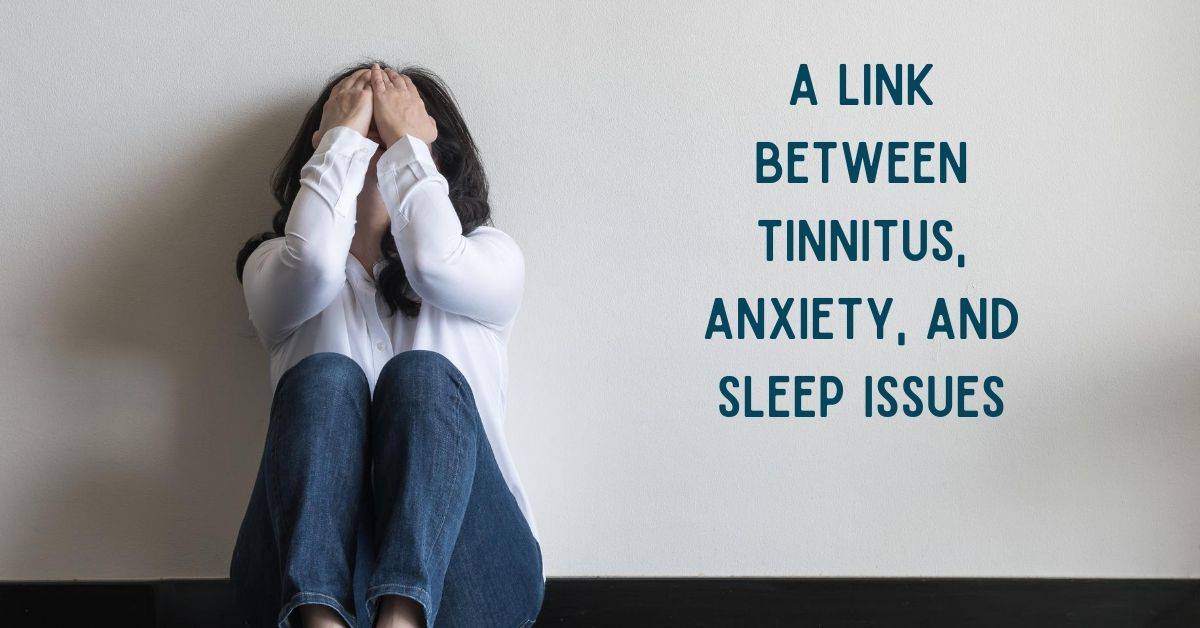The effects of hearing loss not only affect our ability to communicate but can lead to many unexpected side effects.
When we struggle to communicate and find ourselves feeling less connected to friends, family and coworkers, this can cause anxiety, which can lead to chronic insomnia.
Another side effect of hearing loss is tinnitus, which can become even more exasperated due to stress and anxiety. Understanding how hearing loss can affect more than our hearing can give us more agency to deal with our hearing loss before some of these serious side effects can progress to a level of alarm.
Understanding Tinnitus
Tinnitus is a very common condition affecting approximately 15% of all Americans. Tinnitus manifests often as a buzzing, ringing, swooshing or whirling in the ear, which seems to have no external source. Tinnitus can be temporary or a very serious and chronic condition causing extreme stress and sleeplessness.
What Causes Tinnitus?
While hearing loss and tinnitus are not exclusively connected they are often caused by damage to the tiny hairs and cells of the inner ear which relay auditory information to our ears. When excessive sound damages the tiny cells of the inner ear, they can often send unintentional electrical frequencies to the brain, which manifest themselves as tinnitus. Other causes of tinnitus include the natural breakdown due to old age, head injury, or ear infections.
Tinnitus and Anxiety
Tinnitus can be very frustrating. When you finally find a moment of quiet from a busy day and you want silence, tinnitus can become so present it is impossible to ignore. It can become difficult to concentrate on important tasks or in extreme cases even calmly carry on conversation. This can become very stressful.
When you are stressed, you are quicker to become frustrated or quick to temper. Conflicts can become escalated quickly causing more and more stress. The problem with stress is that it can make tinnitus worse, creating a frustrating cycle. Tinnitus causes stress and stress exacerbates tinnitus.
Tinnitus and Sleep Issues
The connection between tinnitus and insomnia is very much connected to the stress that tinnitus can cause. It is extremely hard to unwind from a stressful day. As the conflicts and troubles of day after day dealing with tinnitus amongst a busy schedule mount up it can be increasingly harder to get a good night sleep. Insomnia can also cause even more stress and anxiety as it becomes harder and harder to focus and perform your best in daily tasks.
Dealing with your Tinnitus
While there is no cure to stop tinnitus permanently, there are many treatments available to help you deal with the frustrating effects of tinnitus.
Cognitive Behavioral Therapy
Because tinnitus is often connected to a high level of emotional stress, cognitive behavioral therapy (CBT) has been shown to help a person affected by tinnitus, find ways to live with their tinnitus. Your therapist will help you accept your tinnitus so you can learn to live with it rather than fight the condition.
Exercise and other stress reducing activities
Exercise not only keeps us in shape, feeling healthy and increases endorphins but contributes to our entire well-being. When we can get our heart rate up for at least 20 minutes every day, we can sleep better and lower our stress levels.
Likewise, anything that helps us relax will help us deal with the frustrating effects of tinnitus. Meditation and yoga has been found to allow our brain to focus less on the stress caused by tinnitus and refocus on being calm and centered. Similarly many have found beneficial results from treating their tinnitus with hypnosis, acupuncture and nutritional supplements.
Masking
Often using a less irritating sound to mask your tinnitus can help you ignore its persistence. There are white noise machines that cover the sound and can help you to sleep or concentrate on the task at hand. Similarly playing music in the background can help distract from the constant buzzing in your ears.
Treating Tinnitus with Hearing Aids
Most commonly the causes of tinnitus and hearing loss are connected. Hearing aids amplify the sounds around you making it easier to hear. Many find that the better they hear, the less their tinnitus is an issue. Many hearing aids employ this same tactic to cover or subdue the roar of tinnitus.

